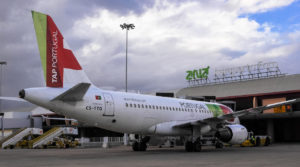
Portugal’s ANA, which operates 10 airports in the country (including Faro), has reassured passengers that it is taking key measures to minimise the impact of COVID-19. In a message to airline travellers, the Aeroportos de Portugal operator stressed it was prioritising the safety of workers and passengers.
“Our airports are in permanent contact with the authorities, complying with government guidelines, and our teams operate in accordance with the safety standards indicated by Portugal’s Directorate-General of Health (DGS).
“We have taken a series of measures in order to mitigate this threat. In view of this difficult moment, we urge our passengers to remain calm, guaranteeing, on our part, permanent surveillance and updated information. We emphasise the importance of reducing visits to airports to what is strictly necessary and only by passengers, in order to avoid crowds in the terminal.”
In addition to a campaign launched to raise individual awareness and strengthen hygiene recommendations, these security measures include:
- Reinforced cleaning of facilities, in the common, circulation and waiting areas, with hospital-level disinfectants available permanently and increased support teams.
- Dozens of hand sanitisers placed at various points in terminals.
- Isolation rooms created so that DGS teams can “deal with suspicious cases immediately on arrival”.
- Posted information made available to passengers.
- Closed lounges.
As for flight restrictions, all air connections with Italy, Spain and the Czech Republic are suspended, as well as all international flights out of the European Union and from outside the European Union to any national airport.
These exclude non-EU countries with a strong presence of Portuguese communities, such as Canada, the United States and South Africa; and Portuguese-speaking countries (except Cape Verde, Angola and Guinea Bissau).
For Brazil, the Lisbon-Rio de Janeiro and Lisbon-Sao Paulo routes are restricted, and all routes to other destinations in Brazil are suspended. Additionally, several other flights are subject to change or cancellation.
British Embassy Travel Advice
Meanwhile, the British Embassy’s updated advice, available here, stresses Foreign & Commonwealth Office recommendations that British nationals should avoid all but essential international travel, as “any country or area may restrict travel without notice”.
“Portugal declared a State of Emergency on 18 March, which has activated a series of measures including significant restrictions on movement throughout the country.
“If you are currently in Portugal, follow the advice of local authorities. If you wish to return to the UK, make travel plans to do so as soon as possible.” The British Embassy in Lisbon is issuing regular updates on Twitter and Facebook with the latest available information on flight departure options for British nationals wanting to leave Portugal. Anyone planning to travel to Portugal is advised to consult their airline or tour operator.”
Regarding borders and travel, according to the embassy, flights to the UK are not affected by measures implemented for most other countries outside the EU/EEA, but airlines have cancelled several flights between the UK and Portugal.
From 16 March until 15 April, border controls are in place on land bordering Spain – including the Algarve. “Cross-border workers, goods traffic and people entering or leaving Portugal to return to their place of residence will be allowed to travel. British nationals can still drive through Spain and France to return to the UK. While driving through France, they will need to complete an ‘attestation’ (declaration) specifying the reason for being outside.”
Public gatherings are banned, and most shops other than those selling food or other essential items such as pharmacies are closed. All citizens have been instructed to remain at home unless they need to carry out one of the following activities:
- Buy food or other essential items.
- Travel to work if unable to work from home.
- Go to hospital or health centres.
- Carry out caring or similar duties, or in case of real need.
- Return to their primary residence.
In addition, public transport services are operating at reduced levels.
